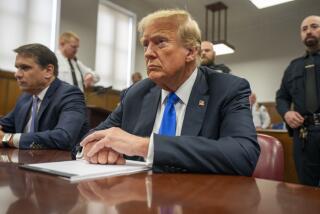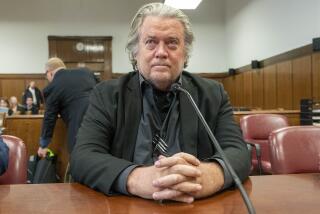Delay Sought in Ruling on Fund-Raiser Huang
- Share via
A Los Angeles federal judge found himself in the middle of a dispute Monday between the Justice Department and a powerful Republican congressman over the sentencing of former Democratic fund-raiser John Huang.
In a letter to U.S. District Judge Richard A. Paez, Rep. Dan Burton asked that Huang’s sentencing for conspiring to violate federal election laws be delayed until he has appeared before the Indiana congressman’s committee, which is investigating alleged campaign finance abuses in the 1996 presidential race.
After he is sentenced, Huang will no longer have any incentive to cooperate, Burton told the judge.
But Assistant U.S. Atty. Daniel J. O’Brien said he opposed hauling Huang before Burton’s committee before sentencing for fear of “repeating the Oliver North episode.”
North was granted immunity from prosecution in the Iran-Contra affair in return for his testimony before Congress, a decision that many lawmakers later conceded was a mistake.
“The question is not whether but when Mr. Huang should testify,” said O’Brien, who has directed the Justice Department’s campaign finance probe on the West Coast.
O’Brien said he plans to file a detailed objection to Burton’s request with the judge today.
Paez had been scheduled to sentence Huang on Monday but put it off until Aug. 12. Attorneys involved in the case said Paez told them in a conference call that he needed more time to study a pre-sentencing report on Huang prepared by federal probation authorities.
As the Democrats’ chief fund-raiser in the Asian American community, Huang raised millions of dollars for the Clinton-Gore campaign in 1996. Much of that money was later returned amid allegations that it came from foreign donors, who are barred from contributing to U.S. elections.
In exchange for his guilty plea to a campaign finance violation unrelated to the 1996 presidential campaign, prosecutors have recommended that Huang receive no jail time, but instead be ordered to pay a $10,000 fine and provide 500 hours of community service.
Huang promised in the plea bargain to cooperate fully with any ongoing investigation by federal, state or local authorities.
Burton said that includes his committee, but added that “Huang continues to invoke his 5th Amendment rights [against self-incrimination] and requests a formal grant of immunity prior to testifying.” He accused Huang of “stonewalling” his committee by asserting his 5th Amendment rights, “even though he has no reasonable fear of prosecution.”
If Huang were forced to appear before the committee before sentencing, Burton said, his cooperation “or failure to cooperate” could be considered by Paez in deciding whether to accept the plea agreement.
Despite Burton’s complaint about Huang’s “stonewalling,” the Justice Department said in the May 21 plea agreement that Huang had previously submitted to about 20 extensive interviews with federal investigators, who found his information to be “credible, extensive and of substantial assistance.”
Some of those interviews were with representatives of three separate independent counsels, including Whitewater prosecutor Kenneth Starr.
Huang, who has been living in seclusion in Glendale, pleaded guilty to a single felony charge of conspiring to violate federal election law. In doing so, he admitted laundering a $2,500 contribution to Michael Woo’s unsuccessful 1993 campaign for Los Angeles mayor against Richard Riordan, and $5,000 to the California Victory Fund ’94. Those funds were shared by Sen. Dianne Feinstein’s reelection committee, the Democratic Senatorial Campaign Committee and the California Democratic Party.
Huang, a former high-ranking executive for the Lippo financial group of Indonesia, was accused of funneling the money through Lippo employees. The conglomerate’s owners, the Riady family, have been friends of Bill Clinton since his days as Arkansas governor.
Asked why Huang was not charged with any crimes in connection with the Clinton-Gore reelection campaign, O’Brien said previously that “we investigated all the allegations and felt that the charges in this case fully addressed his culpability.”
Burton said in his letter to Paez that his committee has amassed a large amount of information about Huang’s role in the 1996 presidential campaign that the Justice Department may not have obtained during its own investigation. He provided no specifics.
Huang became active in campaign fund-raising in the late 1980s in the Los Angeles area. In 1994, he went to Washington to become a deputy assistant secretary of commerce. He was a frequent guest at the White House.
More to Read
Get the L.A. Times Politics newsletter
Deeply reported insights into legislation, politics and policy from Sacramento, Washington and beyond. In your inbox twice per week.
You may occasionally receive promotional content from the Los Angeles Times.










